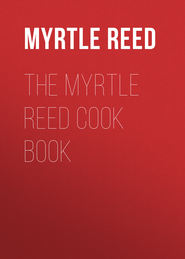По всем вопросам обращайтесь на: info@litportal.ru
(©) 2003-2024.
✖
The Shadow of Victory: A Romance of Fort Dearborn
Настройки чтения
Размер шрифта
Высота строк
Поля
"The boys aren't fools," laughed the Lieutenant. "They can see farther than some. I've spoken to no one but you, but if mutiny arises, I'll let it take its rightful course."
"Well, I won't. Remember what I said."
"I can't remember all your valuable utterances. Don't cast your pearls before swine, but reserve them for – for a more appreciative audience."
Stung to the quick by the insult, Ronald instinctively put his hand on his sword. Then both saw the Captain coming swiftly toward them, and waited.
"It is time for the council," he said.
"Well?" queried the Lieutenant, after an awkward pause.
"Are you going with me?"
Silence.
"Lieutenant Howard and Ensign Ronald, it is time for the council I have appointed with the Indians. Are you going with me?"
"An order, Captain?" inquired Ronald.
"Neither an order nor a request – not even a suggestion. It is an opportunity, to be taken or not, as you choose."
"Speaking for myself," said Ronald, "I do not see what we could accomplish by going. You are the army and the officers of it."
"As you pay no attention to our suggestions," remarked the Lieutenant, "I prefer to remain here."
"Very well." The Captain and Mackenzie went out alone.
"Better go to the blockhouse, hadn't we?" asked Ronald. "There may be trouble."
"I hope there will be," answered Howard. "Let Franklin fight it out alone with his precious Indians. Providence may yet intervene and give me the command."
Ronald went to the blockhouse alone, trained the cannon at the port-holes, and watched the Indians. After the first formal greetings were exchanged, the business of the afternoon began. Franklin spoke to Mackenzie, who translated for the benefit of Black Partridge, and he, in turn, conveyed the message to the assembly.
"We come for the last time," said Captain Franklin, "to speak with our brothers, the red men. Your Great Chief has told you how our Great Chief has bidden us to assemble at another place and how, though our hearts are torn with sorrow, we must obey the command. We have sent swift messengers a day's journey and more on every side, that we might say farewell to those with whom we have so long dwelt in peace. The goods in yonder storehouse, by the mandate of the Great White Father, are to be given to our brothers as a parting gift, that they may long hold us in kindly remembrance, as we shall them.
"We ask, however, a favour in return. We ask that some of our noble brothers, such as it may please, shall escort us to Fort Wayne, the place of our first assembly, and long known to the red men, who have many friends there. We ask that our brothers shall aid us in protecting our women and children from the dangers of the trail. If any are graciously inclined to do this kindness for us, we shall press upon them still other gifts when we reach our destination."
Black Partridge, in a loud voice, repeated the speech in the Indian tongue. Each of the chiefs in the front rank then expressed an opinion upon the subject, as he was asked by the spokesman. Then Black Partridge spoke apart with Mackenzie.
"They say," said the interpreter, "that it is well. They will joyously receive the goods in the storehouse as a parting gift from their white brothers, beside whom they have so long dwelt in peace. The plains will be lonely and the river sad without the palefaces. The houses of the Great White Father will be desolate when the friends of the red men are gone, but as it is written, so must it be. The bravest of the warriors will attend on the trail to Fort Wayne and safely shield the friends of the red men from savages and wild beasts. From all that stalks abroad with intent to slay, the friends of the palefaces will guard them. Let the children of the Great White Father have no fear. All shall be well. Side by side shall they journey with their brothers, the Pottawattomies and the allied tribes. In three moons, or perhaps two, if the Great Spirit is kind, the palefaces will return to dwell with their brothers once more, when their assembly is over and the Great White Father has made known unto them his commands."
"Tell them," said Captain Franklin, "that at the same hour of to-morrow's sun, the presents shall be given them. They shall have blankets, prints, calicoes, broadcloths, and adornments for their women and their papooses. For the Great Chiefs there will be tobacco, war paints, cunning contrivances for the sharpening of weapons, and provisions against the long cold Winter when the hunting grounds are barren, which is but four moons away. Say that the Great White Father will be pleased when he learns how the Great Chiefs, with their fearless braves and warriors, have safely guided his children unto the place of assembly."
"They say it is well," said Mackenzie, after the speech and its answer had been duly made, "and that at the same hour of to-morrow's sun they will assemble here, to receive the parting tokens of the Great White Father."
With much ceremony, the council was concluded and the Indians dispersed. Black Partridge lingered to express his pleasure because all had gone well, then he, too, went along the river bank to the woods where the Indians were gathered.
"Captain," said Mackenzie, "I want to talk to you a bit."
"All right – let's go back to the Fort, where it's cooler."
Ronald came down from the blockhouse as they entered the stockade and went across the river, where Beatrice was visible at a shaded window.
"How about the ammunition and liquor?" asked the trader. "Are you going to include that in the distribution?"
"I hadn't thought about it – why?"
"It's risky," said Mackenzie. "We don't want to furnish them with weapons to use against us. Arm those seven hundred Indians with muskets, give them powder and shot, fill them up with liquor, and where would we be?"
"It might amuse them," replied the Captain, thoughtfully. "If there was whiskey enough in the storehouse to get every man of them dead drunk, except our guides, it might be the best thing to do."
"Unfortunately, we can't force the proper quantity down the throat of each one. Some are wiser than the rest and they wouldn't drink."
"Well, suppose they had the muskets – wouldn't they use them against each other?"
"No," said the trader, conclusively, "they wouldn't. They'd turn against us."
"I hardly think that any of them will go with us, except Black Partridge and a few of his friends. By to-morrow, numerous fights will have started, and they'll be too busy to notice our departure. Besides, they have promised."
"Captain Franklin, the promise of an Indian is absolutely worthless, as you must know by this time. Since the troubles on the Wabash, the general trend of feeling toward us has been hostile. Their tomahawks are bad enough – they don't need our own weapons. When I got as far as De Charme's, last Fall, on my way to Detroit, and heard of the battle of Tippecanoe, I turned back immediately to Fort Dearborn and sent messengers to the outer trading posts with positive orders to furnish neither ammunition nor liquor to the Indians. Do you remember?"
"Yes, I remember. Perhaps it would be as well to keep back the liquor and ammunition, but in that case, they must not know we have them. How can we manage?"
"Bring everything into the Fort secretly, by night, and destroy it."
"Very well," said the Captain, after a silence; "you have had better opportunities than I have had to gain an intimate knowledge of the Indians. To-night and to-morrow night, as secretly as may be, I will have the goods brought in and destroyed."
After Mackenzie went home, the Captain went out to walk back and forth on the prairie near the Fort. His head was bowed and his arms were folded. In spite of General Hull's order and the friendly professions of the Indians, he felt the situation keenly. His responsibility sat heavily upon him, for he knew his officers were opposed to him and had begun to suspect that the men were disaffected. He would not have been surprised at a mutiny, feeling, as he did, that it was a case of one man against the world.
From a window, Katherine saw him walking to and fro, and at first she thought it was her husband, but a second look convinced her of her mistake. She was about to turn away when something arrested her attention.
On the Captain's right, and at some little distance from him, an Indian was moving stealthily toward the Fort. On his left, and still farther away from him, another was doing the same thing.
The Captain turned to the right, and instantly the Indian on that side dropped full length on the grass, while the other moved more quickly toward the Fort. When the Captain turned to the left the manoeuvre was repeated, but it was some time before she grasped the horrid significance of their actions.
When she perceived that both Indians were endeavouring to get between the Captain and the Fort, the blood froze in her veins. The parade-ground was deserted, and the long, droning notes of the locusts were the only sound she heard. She screamed, but the Captain did not turn, and no one seemed to hear. At the gate the sentinel leaned on his musket, unconscious of danger. She screamed again, but could not hear her own voice.
Then the springs of action threw off their lethargy. She dashed out of the house and flew over the parade-ground, with the taste of hot blood in her mouth and a heavy weight upon her breast. Trembling in every nerve, she climbed the ladder that led to the blockhouse, and entered, flushed and gasping. She was dimly conscious that she was not alone, but there was no time to waste.
Praying that she might not be too late, she seized a loaded musket, aimed through the porthole, and fired. It seemed an age before she saw the Captain through the smoke, running back to the Fort, and the two Indians making for the woods.
"Thank God!" she breathed, "thank God!" Then she turned – and faced her husband, his face so ghastly that she scarcely knew him.
"Ralph!" she whispered, hoarsely. "Ralph!"
His eyes refused to meet hers, and a tumult surged in her brain. Detached pictures of her childhood, confused and unrelated memories, and a thousand trivial things passed swiftly before her mental vision. Then, as if by magic, there was a clearing – all things gave way to the horrible knowledge that he had seen – and had failed to warn.
"Ralph! Ralph! My husband!"
"Well, I won't. Remember what I said."
"I can't remember all your valuable utterances. Don't cast your pearls before swine, but reserve them for – for a more appreciative audience."
Stung to the quick by the insult, Ronald instinctively put his hand on his sword. Then both saw the Captain coming swiftly toward them, and waited.
"It is time for the council," he said.
"Well?" queried the Lieutenant, after an awkward pause.
"Are you going with me?"
Silence.
"Lieutenant Howard and Ensign Ronald, it is time for the council I have appointed with the Indians. Are you going with me?"
"An order, Captain?" inquired Ronald.
"Neither an order nor a request – not even a suggestion. It is an opportunity, to be taken or not, as you choose."
"Speaking for myself," said Ronald, "I do not see what we could accomplish by going. You are the army and the officers of it."
"As you pay no attention to our suggestions," remarked the Lieutenant, "I prefer to remain here."
"Very well." The Captain and Mackenzie went out alone.
"Better go to the blockhouse, hadn't we?" asked Ronald. "There may be trouble."
"I hope there will be," answered Howard. "Let Franklin fight it out alone with his precious Indians. Providence may yet intervene and give me the command."
Ronald went to the blockhouse alone, trained the cannon at the port-holes, and watched the Indians. After the first formal greetings were exchanged, the business of the afternoon began. Franklin spoke to Mackenzie, who translated for the benefit of Black Partridge, and he, in turn, conveyed the message to the assembly.
"We come for the last time," said Captain Franklin, "to speak with our brothers, the red men. Your Great Chief has told you how our Great Chief has bidden us to assemble at another place and how, though our hearts are torn with sorrow, we must obey the command. We have sent swift messengers a day's journey and more on every side, that we might say farewell to those with whom we have so long dwelt in peace. The goods in yonder storehouse, by the mandate of the Great White Father, are to be given to our brothers as a parting gift, that they may long hold us in kindly remembrance, as we shall them.
"We ask, however, a favour in return. We ask that some of our noble brothers, such as it may please, shall escort us to Fort Wayne, the place of our first assembly, and long known to the red men, who have many friends there. We ask that our brothers shall aid us in protecting our women and children from the dangers of the trail. If any are graciously inclined to do this kindness for us, we shall press upon them still other gifts when we reach our destination."
Black Partridge, in a loud voice, repeated the speech in the Indian tongue. Each of the chiefs in the front rank then expressed an opinion upon the subject, as he was asked by the spokesman. Then Black Partridge spoke apart with Mackenzie.
"They say," said the interpreter, "that it is well. They will joyously receive the goods in the storehouse as a parting gift from their white brothers, beside whom they have so long dwelt in peace. The plains will be lonely and the river sad without the palefaces. The houses of the Great White Father will be desolate when the friends of the red men are gone, but as it is written, so must it be. The bravest of the warriors will attend on the trail to Fort Wayne and safely shield the friends of the red men from savages and wild beasts. From all that stalks abroad with intent to slay, the friends of the palefaces will guard them. Let the children of the Great White Father have no fear. All shall be well. Side by side shall they journey with their brothers, the Pottawattomies and the allied tribes. In three moons, or perhaps two, if the Great Spirit is kind, the palefaces will return to dwell with their brothers once more, when their assembly is over and the Great White Father has made known unto them his commands."
"Tell them," said Captain Franklin, "that at the same hour of to-morrow's sun, the presents shall be given them. They shall have blankets, prints, calicoes, broadcloths, and adornments for their women and their papooses. For the Great Chiefs there will be tobacco, war paints, cunning contrivances for the sharpening of weapons, and provisions against the long cold Winter when the hunting grounds are barren, which is but four moons away. Say that the Great White Father will be pleased when he learns how the Great Chiefs, with their fearless braves and warriors, have safely guided his children unto the place of assembly."
"They say it is well," said Mackenzie, after the speech and its answer had been duly made, "and that at the same hour of to-morrow's sun they will assemble here, to receive the parting tokens of the Great White Father."
With much ceremony, the council was concluded and the Indians dispersed. Black Partridge lingered to express his pleasure because all had gone well, then he, too, went along the river bank to the woods where the Indians were gathered.
"Captain," said Mackenzie, "I want to talk to you a bit."
"All right – let's go back to the Fort, where it's cooler."
Ronald came down from the blockhouse as they entered the stockade and went across the river, where Beatrice was visible at a shaded window.
"How about the ammunition and liquor?" asked the trader. "Are you going to include that in the distribution?"
"I hadn't thought about it – why?"
"It's risky," said Mackenzie. "We don't want to furnish them with weapons to use against us. Arm those seven hundred Indians with muskets, give them powder and shot, fill them up with liquor, and where would we be?"
"It might amuse them," replied the Captain, thoughtfully. "If there was whiskey enough in the storehouse to get every man of them dead drunk, except our guides, it might be the best thing to do."
"Unfortunately, we can't force the proper quantity down the throat of each one. Some are wiser than the rest and they wouldn't drink."
"Well, suppose they had the muskets – wouldn't they use them against each other?"
"No," said the trader, conclusively, "they wouldn't. They'd turn against us."
"I hardly think that any of them will go with us, except Black Partridge and a few of his friends. By to-morrow, numerous fights will have started, and they'll be too busy to notice our departure. Besides, they have promised."
"Captain Franklin, the promise of an Indian is absolutely worthless, as you must know by this time. Since the troubles on the Wabash, the general trend of feeling toward us has been hostile. Their tomahawks are bad enough – they don't need our own weapons. When I got as far as De Charme's, last Fall, on my way to Detroit, and heard of the battle of Tippecanoe, I turned back immediately to Fort Dearborn and sent messengers to the outer trading posts with positive orders to furnish neither ammunition nor liquor to the Indians. Do you remember?"
"Yes, I remember. Perhaps it would be as well to keep back the liquor and ammunition, but in that case, they must not know we have them. How can we manage?"
"Bring everything into the Fort secretly, by night, and destroy it."
"Very well," said the Captain, after a silence; "you have had better opportunities than I have had to gain an intimate knowledge of the Indians. To-night and to-morrow night, as secretly as may be, I will have the goods brought in and destroyed."
After Mackenzie went home, the Captain went out to walk back and forth on the prairie near the Fort. His head was bowed and his arms were folded. In spite of General Hull's order and the friendly professions of the Indians, he felt the situation keenly. His responsibility sat heavily upon him, for he knew his officers were opposed to him and had begun to suspect that the men were disaffected. He would not have been surprised at a mutiny, feeling, as he did, that it was a case of one man against the world.
From a window, Katherine saw him walking to and fro, and at first she thought it was her husband, but a second look convinced her of her mistake. She was about to turn away when something arrested her attention.
On the Captain's right, and at some little distance from him, an Indian was moving stealthily toward the Fort. On his left, and still farther away from him, another was doing the same thing.
The Captain turned to the right, and instantly the Indian on that side dropped full length on the grass, while the other moved more quickly toward the Fort. When the Captain turned to the left the manoeuvre was repeated, but it was some time before she grasped the horrid significance of their actions.
When she perceived that both Indians were endeavouring to get between the Captain and the Fort, the blood froze in her veins. The parade-ground was deserted, and the long, droning notes of the locusts were the only sound she heard. She screamed, but the Captain did not turn, and no one seemed to hear. At the gate the sentinel leaned on his musket, unconscious of danger. She screamed again, but could not hear her own voice.
Then the springs of action threw off their lethargy. She dashed out of the house and flew over the parade-ground, with the taste of hot blood in her mouth and a heavy weight upon her breast. Trembling in every nerve, she climbed the ladder that led to the blockhouse, and entered, flushed and gasping. She was dimly conscious that she was not alone, but there was no time to waste.
Praying that she might not be too late, she seized a loaded musket, aimed through the porthole, and fired. It seemed an age before she saw the Captain through the smoke, running back to the Fort, and the two Indians making for the woods.
"Thank God!" she breathed, "thank God!" Then she turned – and faced her husband, his face so ghastly that she scarcely knew him.
"Ralph!" she whispered, hoarsely. "Ralph!"
His eyes refused to meet hers, and a tumult surged in her brain. Detached pictures of her childhood, confused and unrelated memories, and a thousand trivial things passed swiftly before her mental vision. Then, as if by magic, there was a clearing – all things gave way to the horrible knowledge that he had seen – and had failed to warn.
"Ralph! Ralph! My husband!"











